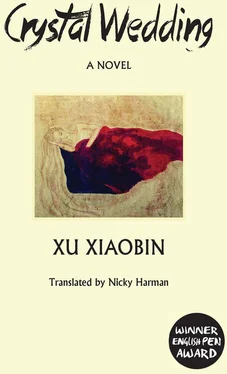The landlady had been abandoned by her husband, Tianyue told her. She ran a one-woman business making jewellery and had a daughter. She apparently missed her daughter terribly but as soon as the two were together, they quarrelled. Mainly about money.
The woman gave Tianyi a hard, unfriendly look. Tianyi tried her very best to charm her, more for her sister’s sake than her own. She paid the old witch so many compliments that she began to sound corny even to her own ears but, in any case, it appeared to have no effect at all.
Ke could afford to ignore all this, because he had money. He rented an apartment of his own as soon as he could, a generously-sized one with its own entrance, a spacious living room and an open-plan kitchen — the first time Tianyi had seen this kind of layout. She had grown up living in a cramped, Soviet-style terraced house allocated to them by her father’s college, ugly but solidly-built, where the kitchen was too small to swing a cat.
The supermarkets in America astonished her. Growing up in Beijing, she had never seen anything like it. She watched as her sister and Ke piled all manner of things into their shopping trolley: pots and pans, vegetables and fruit, rice and other groceries appeared as if by magic. She was astonished to see that a large carton of concentrated fruit juice was reduced to 70 cents, because it was two days past its sell-by date.
It was so simple to make a new home. She bustled around in it, remembering how she had loved moving to a new home when she was little, because it brought her a whole new group of friends. But now they were in America. The neighbours were friendly but they kept their distance. She liked this feeling of distance, people ought not to be crammed cheek by jowl, it was cleaner this way.
And how clean Salt Lake University campus was! In Beijing, if you wore a pair of sandals outside for three days, they would be filthy but here they never got dirty. Even the piled-up snow looked spotless. Tianyi liked to go out in the early mornings for a leisurely stroll through the silvery landscape, wearing a bright red woollen cape that she had bought especially for this trip. As she walked along, someone might stick their head out of a passing car and call a friendly: ‘Hi!’ And, quite naturally, she would respond: ‘Hi!’ They might give a wink and a smile, and her own answering smile would come spilling out. These small gestures made her feel immediately at home. She could not understand why so many Chinese, including Lian, found America alienating. She felt as if she had been born here. How clean, innocent, friendly and unthreatening these winks were!
Tianyi was quite convinced that America was her ideal country. Her American dream lasted right up until she stepped on its soil for the second time, some years later, and found everything had changed. Nine Eleven destroyed this people, there were no more clean, innocent winks.
On this first visit, however, Tianyi fell in love with the place, its people, its scenery, everything about it. Every morning she got up early and went out for a walk in the snow, wearing her bright-red cape, enjoying the extraordinary blossoms, the fairytale-like houses, and those clean, innocent smiles.
Some of the shops opened very early but most at ten o’clock. Any that had an OPEN sign, and a display of fresh flowers and souvenirs (often made by the native Americans), she would go in, saying in response to the sales assistant’s friendly smile: ‘I’m just looking.’ Then she would subject the displays to a careful inspection, feeling quite safe and content. She made the occasional purchase, too. Everything was so ingeniously made, for instance a tiny house made out of wire, or a piece of light blue stone carved with the head of native American. Often, when she took them home, Ke teased her: ‘You’re just like Lian said, like a child!’
A Professor Jones had asked her to give a lecture at Salt Lake University, on the subject of women’s writing and Drowning . The thought of her book reminded Tianyi that she was only here on a visit. The reality she had deliberately ignored came back with absolute clarity: far away in the East, in a very ordinary apartment building, she had a violent husband and a weakling of a son. That clarity turned in her guts like a knife.
All the overseas Chinese students, and students studying Chinese culture and language turned up. There was not an empty seat in the lecture theatre. From their expressions and their applause, she knew that they understood Drowning , and her. It was no doubt the first time they had had a Chinese author come to lecture them on Chinese literature here in this rural backwater. Most Americans imagined that Chinese were like the people in Zhang Yimou’s films, the women tottering along on bound feet, the men smoking opium, or dressed in baggy trousers, herding their animals on the loess plateau. This ordinary-looking Chinese woman gave them a very different view of China. The world of Chinese intellectuals and scholars had been closed off to the rest of the world since the 1930s. The rulers of New China had been extremely hostile to the educated class, targeting them in one movement after another. By the modern era, there were no traces left of the moral principles of China’s ancient scholars.
Tianyi often lay awake worrying about what kind of race the Chinese would turn into if things carried on like this. Over the centuries, most of those loyal officials brave enough to criticise their superiors to their faces had been punished with death while those who were lucky enough to escape that fate were subjected to one calamity after another. That just left sycophants prepared to work the system. A whole people had been bled dry of the quality of loyalty. Zheng was one of a kind and, by sheer good luck, had managed to survive, but only by risking his life and staring death in the face. She felt as if her heart was breaking.
From the day when she first trod on the soil of the United States of America, she had been searching for Zheng. All she knew was that he was on the East Coast, nothing more than that.
The evening of the lecture, Ke mysteriously pulled her to one side and said in a low voice: ‘I’ve been thinking today of…of trying to get your sister on side. What do you reckon?’ Tianyi almost laughed out loud: Ke’s jokey way of putting things surely concealed a deep insecurity. She said offhandedly: ‘Do you think it’ll work?’ Ke eyed her uncertainly. ‘You know, my sister is pretty much immune to being “got on side”,’ she went on. Ke’s thick eyebrows clumped together in a frown, and she softened: ‘From what I know of my sister, she’s someone who goes for spontaneity, so the less you plan it, the better the results will be.’
That evening turned into a seminar on Ke’s problems. Tianyi had not realized just how serious they were. What Ke had told her was just the tip of the iceberg. Actually, he was in very deep trouble. He had started with a software company, and moved into property in the early nineties. His was probably the first real estate company on the mainland. He got himself certificated by a high-level local official who, in his words, was a ‘hyena’. And not the only one. Ke had taken on a tower block, and when it was under construction, this official was just one in a whole pack of hyenas, all busily engaged in getting their rake-off from the wealthy investor who was funding the project.
Of course, the wealthy property investor was not above a bit of wheeling and dealing himself. He only knew Ke, never having met the officials who were on the take, so it was Ke he started to put the screws on. The odd thing was that, even before she knew the facts, Tianyi’s I Ching reading had been that Ke needed to ‘wade the great river’ and start afresh. This prediction had earned Ke’s undying admiration.
Читать дальше












